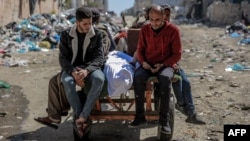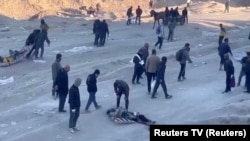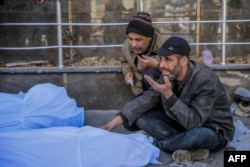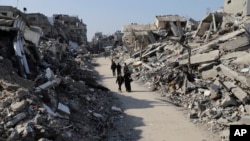At least 112 Palestinians seeking humanitarian aid were killed in Gaza City early Thursday and scores more were injured in what witnesses and Gazan health officials said was the result of Israeli fire. Israel disputed that, saying scores of people trampled each other and were run over by fleeing aid trucks.
The latest violence pushed the Palestinian death toll in the nearly five-month war to more than 30,000, with another 70,000 injured and many more missing under the rubble, according to the Hamas-run Gaza Health Ministry.
Gaza hospital officials initially reported an Israeli strike on the crowd at the al-Nabusi roundabout in the western part of Gaza City. Witnesses later said Israeli troops opened fire as people pulled flour and canned goods off aid trucks.
Little aid has reached northern Gaza in recent weeks and hunger is rampant. The United Nations has warned that famine is imminent.
Initially, Israeli officials acknowledged that troops opened fire, saying they did so because they thought the people rushing toward the aid trucks "posed a threat."
But in a video statement posted later Thursday to the social media platform X, a spokesperson for the Israel Defense Forces said troops fired only “a few warning shots” to disperse the people.
“No IDF strike was conducted towards the aid convoy,” spokesperson Rear Admiral Daniel Hagari said, adding that Israeli tanks were present to secure a humanitarian corridor for the 38-truck convoy to pass.
The IDF also initially said that "dozens were killed and injured from pushing, trampling and being run over by the trucks." Hagari echoed that, saying “thousands” of Gazans descended on the aid convoy.
“Some began violently pushing and even trampling other Gazans to death, looting the humanitarian supplies,” Hagari said.
He said the aid was to be distributed by private contractors and that the IDF had carried out similar relief operations for the past four nights without incident.
"This latest event needs to be thoroughly investigated," White House spokesperson Olivia Dalton told reporters aboard Air Force One, traveling with President Joe Biden to the U.S.-Mexico border.
Dalton called the incident in northern Gaza “tremendously alarming and of deep concern to us.” She said the loss of life was “deeply tragic.”
"We also think that this event underscores the need for expanded humanitarian aid to make its way into Gaza,” she added.
Biden predicted earlier this week that negotiations among the U.S., Qatar and Egypt could produce a cease-fire between Israel and Hamas by Monday. But when asked Thursday by reporters after the convoy incident if he still thought that was possible, he replied, “Probably not by Monday.” But he did not rule it out entirely, saying, "Hope springs eternal.”
The White House said Biden had separate calls with the president of Egypt and the emir of Qatar, and they discussed both the civilian deaths and the urgency of concluding the hostage and cease-fire negotiations.
The war was triggered when Hamas carried out terror attacks inside Israel, killing 1,200 people and kidnapping about 240 others, around 100 of whom were released during a brief pause in November.
U.N. Secretary-General Antonio Guterres expressed his shock to reporters in St. Vincent and the Grenadines, where he was attending a summit of Latin American and Caribbean nations.
“I think that a situation like this would require an effective independent investigation to detect how it was possible and those responsible for it,” he said.
In New York, the U.N. Security Council met for a late-day, closed-door meeting at the request of Algeria, the Arab bloc representative on the 15-nation council.
Palestinian envoy Riyad Mansour called the aid incident an “outrageous massacre.”
“According to the information that we have, dozens of them have bullets in their heads,” he said of the people who were at the scene. “It’s not like firing at the sky to restrain people if there was confusion and chaos. It was intentionally targeting and killing.”
“At this stage there are still facts that have to be clarified,” France’s ambassador, Nicolas de Riviere, told reporters. “All the light must be shed on these events.”
The council failed to agree an Algerian-drafted press statement condemning the incident because it named Israel as the perpetrator and some diplomats said they did not yet have all the facts surrounding the incident.
VOA U.N. Correspondent Margaret Besheer contributed to this report. Some information came from The Associated Press, Agence France-Presse and Reuters.




